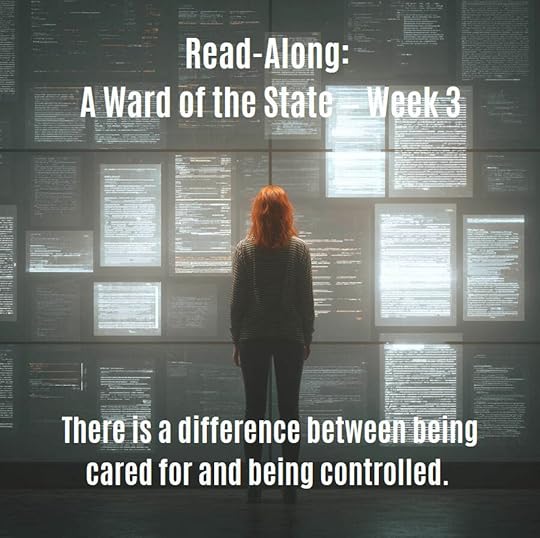M.E. Wright's Blog
September 16, 2025
When Rights Shift Quietly

When I started writing The Fatherhood Mandate, my focus was on bodily autonomy and what its loss would mean for families and for society. I did not look closely at other outcomes.
One of those outcomes caught my attention while I was outlining A Ward of the State in 2024: the push from the far right to remove the right of women to vote.
It was never framed as a repeal of the 19th Amendment that guaranteed women the right to vote. It was wrapped in softer language. Nostalgia. We need to go back to a time when men voted for the entire household. We need to make sure wives do not cancel out their husbands’ votes. Some even claimed women did not want the vote at all, that traditional values meant they would gladly hand that power back.
I folded that idea into A Ward of the State. Just a background detail Allison would know as history. Not the focus of her story, but a reminder of how fast a right can slip away.
Now the headlines are not just whispering about it.
In April, the U.S. House passed the SAVE Act, a bill that would require documentary proof of citizenship—such as a birth certificate or passport—before registering to vote in federal elections. It has not cleared the Senate. It is not law. Not yet. But the fact that it moved through one chamber of Congress at all should make us pause.
On paper, it sounds like security. In reality, millions of married women could be cut out simply because their names no longer match their documents.
Wisconsin went further. In April, voters approved a constitutional amendment that locked the state’s photo ID requirement into the Constitution. That rule was already law. Now it is harder to change, harder to soften, harder to carve out exceptions for people who fall between the cracks.
Texas debated similar bills this year. Even some Republicans admitted they worried the laws might block their own supporters. Older women. Married women. People who never thought they would need their birth certificate to cast a ballot. The bill did not pass. Not yet. But the attempt matters.
And Pete Hegseth went further still. In August he reposted a video from pastors who argued that women should no longer be allowed to vote and that ballots should be cast by households instead of individuals. He captioned it, “All of Christ for All of Life.” The Pentagon later clarified his position, but the repost said enough.
This is how it happens. Not with sirens. Not with a headline that says repeal. With softer words. With nostalgia. With a new condition here and an extra requirement there.
In The Unborn Child Protection Act series, rights disappear slowly until one day they are simply gone. Allison cannot remember a time when women had the right to vote. By 2042, that right was history.
This is what I see happening around us now.
There is no countdown. No schedule of states voting to repeal the 19th Amendment or an executive order reducing ballots to properly registered heads of household. The next story begins as the calm disintegrates into the next storm.
Thanks for reading The Unborn Child Protection Act Companion Site!
August 31, 2025
Why Your Book Club Might Be Exactly Who I’m Writing For

Some books are easy to suggest. The ones that matter rarely are. You want something with depth, something that invites reflection, something strong enough to carry a conversation past the last page.
Problem is, the books that start real conversations are often the ones no one wants to bring into the room first. Too intense. Too political. Too much. We all say we want meaningful discussions. But someone still has to be the first to light the match.
That’s exactly why I think your group might be the right one for these stories.
When I wrote The Fatherhood Mandate, I thought it would be a one-time project. One sharp story with political weight and personal cost. Then I’d move on. But readers didn’t want to move on. They wanted Rylee’s perspective. They needed to understand the world Allison would grow up in. They wanted to know what happened next. And I realized these stories weren’t meant to sit quietly on a shelf. They were meant to be shared, discussed, turned over in your hands like a question that refuses to settle.
The Unborn Child Protection Act series doesn’t offer easy answers. These books live in the tension between law and identity, parenthood and control, freedom and compliance. They ask what happens when family becomes a legal designation instead of something you choose. And what happens when the system no longer pretends to care what you want.
But they’re also about people. About girls trying to find a way out. About parents making impossible choices. About the quiet strength it takes to resist when no one believes you should.
These stories open the door to conversations about power, parental rights, consent, surveillance, race, class, religion, and what it means to raise a child in a world that watches your every move. Whether your group leans literary, political, or personal, there’s something in these pages worth unpacking together.
I believe the best book clubs aren’t afraid of discomfort. They don’t back down when someone says, “That part got to me.” They stay in the conversation. They keep asking questions. They make space for disagreement without shutting down. They let the book breathe, even when it hurts.
If you’ve read these stories and found yourself needing to talk about them, that’s the moment they became something more. And if your club is willing to go there with you, you’re not just choosing a book. You’re choosing to face the world as it is and imagine what it could become in the near future.
So, here’s the deal: Your club members can buy EPUBs or signed paperbacks directly from my site with a 10% discount. If you’re interested, I can join the meeting via Zoom or Google Meets to join your conversation. And if your club orders ten or more copies, I’ll send a custom Resistance Kit with story-based extras: a sealed message from a character, replica court forms or recipes. Who knows, maybe even some discreet merch from the world they’re resisting.
When your group buys directly from me, you’re not just skipping Amazon. You’re investing in the stories that don’t flinch, the voices that go there, and the authors who keep writing even when it’s hard to look.
Some stories are invitations. Others are warnings. These books are both. So, download the guide to A Ward of the State and grab your discount now!
August 24, 2025
This was supposed to be one book

I thought The Fatherhood Mandate would be a one-and-done project. One sharp story. One future to warn about. Then I’d move on to something else. I had other books planned. Other timelines. Other worlds.
But then readers asked to see things from Rylee’s point of view. They wanted to understand the choices she made, the things she couldn't tell Sam, and the silence she carried. And after that, it wasn’t enough to end the story there. They needed to know what kind of world Allison was going to grow up in. What came next. What happened as the law kept evolving.
So I created a timeline. I studied court cases, state laws, and campaign promises. I mapped out a slow progression of restrictions, power shifts, and definitions that quietly changed what a person could do with their own body. I made a few projections about social policy and surveillance. At the time, it felt like a fictional stretch.
But the stretch didn’t hold.
The changes started coming faster than expected. Some of what I had imagined arrived years ahead of schedule. Some things I thought were too extreme to include in the book showed up in legislative drafts. I found myself rewriting not because the stories changed, but because reality wouldn’t wait. What started as a self-contained book became a series. And now the series is expanding again.
This next set of stories wasn’t supposed to exist. Not yet. Not like this. They were meant to be smaller. Quiet background pieces. Now they feel urgent. Each one is built around something real. A headline. A ruling. A policy proposal. A threat.
Unfit takes place in a version of America where interracial marriage is no longer a federally protected right. It falls under individual state rights and a marriage from another state is no longer automatically recognized. A couple expecting their first child must pass a parental fitness evaluation in a state that may have already decided their relationship is invalid.
Exit Strategy follows a woman who plans her abortion with military precision. As she boards a plane to take her out of the country, the U.S. announces that all women of childbearing years will be screened for pregnancy before they are allowed to travel.
Birthright takes place in the near future where citizenship may be conferred based on the state you’re born in. A presidental executive order has demanded that states include parental citizenship on every newborn’s birth certificate. The right paperwork matters more than the right to exist.
The Auditor introduces a state education officer tasked with investigating an illegal tutoring ring. It’s not about academic fraud. It’s a quiet act of rebellion, students being taught to think in a world that no longer permits it.
Each of these stories lives in the The Unborn Child Protection Act universe. They take place at the edges. In new homes. With different families. But the law that governs them is the same. It’s the same foundation. The same surveillance. The same structure of control, just dressed in different language.
Some of the novellas will be short. Others may stretch longer than I expect. Some will feel brutal. Some will be quiet. But none of them are optional anymore. Not for me.
You see, Exit Strategy was supposed to end cleanly. But the main character made a different choice. She didn’t stop when the flight landed. She kept going. And that decision may open the door to something larger, a bridge into a whole other story I hadn’t planned to tell yet. Maybe even a new series.
I didn’t plan to build a world. I wrote one book. Then I wrote the aftermath. Now I’m writing in the fractures appearing in our communities. Not because I had a long-term publishing plan. Because the cracks are already here.
I thought we had more time.
August 17, 2025
How This Fiction Became Familiar

When readers ask, “Where did this world come from?” I usually point to the future. The Unborn Child Protection Act series is speculative fiction, built from imagined legislation and sharpened political trends. But I didn’t start with the future. I started with the present. And I traced it back to the moment the protections fell away.
June 24, 2022, was the day the United States Supreme Court overturned Roe v. Wade. It was also the foundation of The Fatherhood Mandate. From there, I didn’t have to invent much. I followed the real-world events: the halting of abortion services in Wisconsin, the legislature’s refusal to act, and the legal uncertainty that followed. I looked at laws that had been dormant for over a century and watched them quietly return to power. Then I asked the next question. What happens if nothing interrupts this?
In the world of The Fatherhood Mandate, Wisconsin never repeals its 1849 abortion statute. Instead, lawmakers amend Act 292 and the state constitution. Life is defined at conception. A fetal heartbeat triggers legal protection. Unmarried women who become pregnant, and are considered to be a threat to their unborn child, are monitored, detained, or removed from their homes. The father—however he’s defined—is held legally and financially responsible for their offspring through age twenty-one. Consent, circumstance, and relationship history are irrelevant.
This version of “personal responsibility” doesn’t care about context. It enforces a moral expectation through legislative structure. And the system is designed to punish deviation rather than understand it.
By the time I started work on The Motherhood Mandate, the consequences are widespread and institutional. Cancer treatments are delayed until after delivery. Emergency procedures require legal justification. Once a fetal heartbeat is detected, the pregnant woman is no longer the primary patient. She is a vessel to be monitored. Her safety is considered, but rarely prioritized. Women bleed out in hospital parking lots and beg for treatment.
These changes aren’t born from a single law. They come from a pattern of decisions—judicial, legislative, and cultural—that slowly shift the legal definition of personhood. When a government is allowed to define when life begins and whose life matters more, it also gains the ability to shape parenthood, consent, and adulthood. And it will. Quietly, at first. Then quickly, with very little pushes back.
The books contain laws you won’t find in the real world—yet. But they’re all built from language that has appeared in courtrooms, on ballots, and in public discourse. One such law requires unmarried parents to live together during late pregnancy and through the child’s sixth month. Another raises the legal age of adulthood to twenty-one, stripping voting rights and decision-making from teenagers who are already parents themselves. None of these laws are fantasy. They are extensions of arguments already being made in public.
Some of the earliest plot points I wrote never needed to be changed. Others were softened, not for believability, but because the real world had already outpaced them. I originally structured this series around a slower legal decline, with the most extreme outcomes unfolding in the early 2030s. I assumed the Supreme Court would uphold a 15-week abortion ban in Dobbs v. Jackson Women’s Health Organization. I never imagined they would overturn Roe outright.
When that ruling came down in 2022, I had to rewrite the entire timeline. What I thought would take a decade began unfolding in months. I moved key legislative shifts and court cases into the mid-2020s, not to dramatize them, but to match what was already happening. Fiction didn't need to lead. It needed to reflect.
When people ask what I cut from these books, I sometimes hesitate. Not because I don’t remember, but because the answer is almost nothing. The arc of the laws remained the same. The systems of control remained the same. All I did was give them a name, a date, and someone to suffer under them.
This series isn’t prophecy. It’s documentation of a possible path. And the further we go, the more familiar it looks.
If you’ve read The Fatherhood Mandate or The Motherhood Mandate, and it made you pause, that’s the point. These stories were written to reflect the slow drift of law away from protection and toward possession. What you’re seeing is a world where that drift wasn’t interrupted.
And if you're seeing pieces of that world already, you're not imagining it.
August 10, 2025
Why I’m Giving the Books Away

I didn’t plan to give these books away. When I started writing The Unborn Child Protection Act series, I expected pushback. The stories are direct. They ask uncomfortable questions. But I believed that urgency would carry them. I thought that when reality caught up to fiction, readers would lean in.
Instead, many pulled back.
Not because the books didn’t matter, but because they mattered too much. The line between imagined futures and current headlines began to blur, and with it came fatigue. Readers weren’t disengaging because they didn’t care. They were already overwhelmed. When fiction stops offering distance from reality, it stops offering relief.
That silence was hard to ignore. So I made a decision.
This month, I’m offering the first chapter of each book in the series, one each Friday. No signup, no funnel. Just an open door for readers who need time, context, and space before they commit to more.
At the same time, I’m giving away full books through contests, signed editions, and audiobook bundles. These giveaways aren’t about sales or reach. They’re about making sure the stories remain accessible when platforms and algorithms fall short.
The free chapters are about invitation. The giveaways are about preservation. One welcomes the reader. The other protects the story.
None of this was part of a release plan. It’s a response to the moment we’re in. These books are not banned. But stories like these often vanish without headlines. They get labeled as too political or too real. They get overlooked, not because they’re irrelevant, but because they’re uncomfortably close.
That is how suppression often works. Not through force, but through quiet disappearance.
I don’t intend to let that happen.
If the world continues moving toward the one I wrote, then giving these books away is not a sacrifice. It’s a responsibility. I would rather these stories be read freely than priced beyond reach. I would rather be clear than palatable. I would rather be found than forgotten.
So I’m putting the story where it belongs—in the hands of readers who are still paying attention.
Because if fiction is the last place we’re allowed to tell the truth, then I’ll give it away for as long as I can.
August 4, 2025
Stepping Into the Woman She Was Meant to Be
There’s a difference between surviving a system and stepping outside of it. Between learning to adapt and deciding that adaptation is no longer enough. For Allison Maxwell, the journey across these chapters wasn’t just about escape. It was about becoming.

The girl we met was bright, observant, and angry. She had every reason to be. She was disoriented by the sudden shift in her life, unsettled by the placid compliance of those around her, and disillusioned with the institutions claiming to act in her best interest. Her story could have stopped there, another teenager dismissed as difficult. But Allison made a different choice. She chose to stay awake.
As we move through her journey, that choice grows teeth. It becomes deliberate. She begins to observe not just what is broken, but how it stays broken. She collects not just emotions, but evidence. She no longer hopes the adults will fix things. She begins preparing to challenge the terms herself.
In some stories, that’s where the arc ends: a declaration of resistance, a middle finger to the system. But A Ward of the State goes further. It asks what happens next. When the data is collected. When the confrontation is survived. When the world says, "Fine, you win."
What does a girl like Allison do with that?
She heals. She lets her walls down, just enough. She lets her parents see her not as a burden to manage or a problem to solve, but as the young woman she has become, someone worthy of being trusted. And for the first time, she sees them not as perfect or irredeemable, but as people. Fallible. Messy. Capable.
The scenes that follow aren’t built on fireworks or victory speeches. They’re quiet. A dinner gone slightly wrong. A campfire. A collection of goodbye gifts from friends who understand the weight of leaving. The sting of memory woven into departure. A moment of pride as she steps into her new life not as someone else's ward, but as someone who got herself free.
That’s what makes Allison’s journey resonate. Not that she toppled the system. Not that she was granted some symbolic freedom. But that she made meaning from it. She chose not just to leave, but to live. To rebuild. To reach for joy, even when the past tried to follow her.
There is a specific power in witnessing a girl who’s been categorized and controlled turn around and say, "I still get to decide who I am." Even more so when she doesn’t say it with defiance, but with grace.
Stepping into the woman she was meant to be doesn’t mean becoming what others expected. It meant choosing what mattered. It meant allowing herself to feel the love that had always been there. Complicated, imperfect, but real. And it meant entering a new chapter not with certainty, but with self-trust.
This story was never just about laws, or rights, or even resistance. It was about identity. Who gets to shape it. Who gets to protect it. And what it means to reclaim it after someone else tried to define you.
If you missed the Read-Along, you can still begin that journey. A Ward of the State is available now for just $2.99, directly from the author:
August 2, 2025
More Than a Story. It's a Signal.

Every time someone finishes one of these stories and sends a message that says, “Wait… this could actually happen,” I remember why this series exists.
It’s not about scaring you. It’s about preparing you.
So if you’ve been reading along — or lurking quietly in the background — this month is your invitation to go deeper, get rewarded, and maybe even bring a few others with you.
Here’s what’s waiting for you:
Free First Chapters (Fridays in August)Starting August 9, I’m releasing the first chapter of each novel in The Unborn Child Protection Act series as a downloadable PDF or EPUB.
Whether you’re sampling the series or circling back to the beginning, here’s the lineup:
August 9: Thin Blue Lines – Where it all begins
August 16: The Fatherhood Mandate – Forced legacy, court-appointed paternity
August 23: The Motherhood Mandate – Monitored pregnancy, no exit
August 30: A Ward of the State – Childhood under surveillance, rebellion in motion
Follow along on Instagram to get download access each week!
Win the Audiobook BundlePrefer listening over reading? This one’s for you:
I’m giving away the full audiobook collection on Audible — all four books in one bundle. Professionally narrated, immersive, and hard to pause once you start.
Deadline to enter: August 31
Winner receives: Full series via Audible gift code
Enter to win: One law changed everything
These books are meant to be discussed. If you’re in a book club — or want to start one — you’ll get:
A 10% on any EPUB or signed print book purchased from my site.
An “Ask the Author Anything” session via Zoom or Google Meet.
A growing set of discussion guides and behind-the-scenes resources to help spark real conversations, even around the toughest moments
Bonus: If your club orders 10 or more copies (ebook or print) directly from the site, I’ll send you a custom Resistance Kit filled with story-specific extras. It could be merch. It might be redacted files. Maybe even a sealed message from a character. No two kits are the same.
Interested? I’ll work directly with you if your group wants something custom. Explore book club perks. All I ask is that you’re subscribed to the newsletter so we can stay connected.
Whether you're here for the audiobook giveaway, the upcoming free chapters, or the stories that keep circling back in your mind, this month is for you.
So, mark your calendar. New chapters begin releasing every Friday starting August 9. Each one will be available to download as a PDF or EPUB, with access announced through Instagram and my newsletter.
The audiobook giveaway runs through August 31. If you haven’t entered yet, now’s your chance to get the entire series on Audible as a bundle.
And if you're reading with a book club—or thinking about starting one—this is the perfect time to reach out. I've got materials, discounts, and story-specific bonuses to support your group.
These stories were never meant to stay on the page. They were built to be read, questioned, and shared. Let’s keep reading together.
July 28, 2025
Read-Along Week 4: Don’t Escape the System. Outsmart It.
For most of her life, Allison Maxwell was told who she was. Told what was best for her. Told where to live, what to study, how to behave. And for a while, she tried to meet those expectations, even when they felt like a cage. But the girl we saw at the start of this story isn’t the same girl we see now. Something changed—not just around her, but within her. She stopped reacting. She started planning.

This part of the story isn’t loud. It’s quiet. But it’s also the most dangerous thing a young woman can do in a system that feeds on obedience: she stopped asking. She learned the rules. She studied the logic. She documented the failures. And when she finally made her move, it wasn’t to be rescued. It was to reclaim her future.
There’s a specific moment when you stop hoping someone will come in and fix it. It’s not cynical—it’s clarifying. You start noticing the shape of the structure around you. The language it rewards. The way it demands proof from some people but not others. You start to understand what kind of evidence the system requires to even begin to acknowledge harm.
And when that happens, you have a choice. You can despair. Or you can start to gather what you need.
Not every kind of resistance looks like rage. Sometimes it looks like spreadsheets. Like timelines. Like transcripts. Like cross-referenced curriculum records. Sometimes it means knowing the institution well enough to beat it at its own game. And that’s exactly what Allison begins to do. Not just to get out—but to make sense of what she’s been through. To understand what it cost her. And what it nearly erased.
She doesn’t run. She listens. She connects the dots. She collects the right kind of language and learns how to speak it back to the system. The surveillance doesn’t let up. The pressure doesn’t ease. But she gets smarter. Quieter. More precise.
She also learns the parts of the story her parents never told her.
That’s the part that hits differently. Because it’s one thing to challenge a law. It’s another to read the evidence that your life wasn’t always wanted. That your existence was once the subject of an argument. That your birth might have been circumstantial, not chosen. And yet, what she uncovers doesn’t hollow her out. It shows her where the silence came from. It gives shape to the things they couldn’t say.
And finally, they say them.
This arc isn’t just about rebellion. It’s about clarity. It’s about the moment you realize you’re not a puzzle to be solved, or a problem to be placed. You’re the protagonist. The one keeping the receipts. The one rewriting the ending.
There’s no fanfare. No sweeping justice. Just movement. And arrival.
And for the first time, the place she lands isn’t a sentence. It’s a fresh beginning.
Missed the Read Along? You can still get A Ward of the State directly from the author at mewrightauthor.com. Digital and signed print editions available.
July 20, 2025
Read-Along Week 3: The Truth Was Always There
Week 3 of the A Ward of the State Read-Along | Chapters: 11–15
Allison has always known her life was structured. What she didn’t know was just how many of those structures were made to control her.
This week’s theme is Truth Has a Cost.

The phrase isn’t shouted or even said aloud. But once Allison sees the pattern, it becomes impossible to unsee. The false starts, the too-perfect explanations, the annual lawyer visits she was told not to worry about. All of them trace back to a simple truth: her life was being managed behind the scenes.
Her academic schedule isn’t just academic. It’s curated to meet expectations she didn’t set. Her parents’ custody agreement was court-ordered. Her guardian is not just some nice family attorney but someone appointed before she was born.
Each chapter this week reveals another layer. The mugging that felt like an isolated incident? A sign of deeper unrest. The sudden dinner meeting about safety? A reaction to risk she didn’t create. The change in her school schedule? A response to pressures she didn’t fully understand.
But the biggest reveal comes not from her parents, not from the school, and not even from her cousin. It comes from Allison herself. She pieces together a timeline. She reviews documents. She asks the hard questions. And when the answers come, they don’t sound like protection. They sound like containment.
There is a difference between being cared for and being controlled. Between being safe and being silenced.
Allison is still trying to figure out what that difference looks like in real life. And so are many of us.
Let’s talk:Have you ever found out something that made your entire childhood look different?
What helped you move forward after learning that truth?
How do you distinguish between care and control in your own life?
If you’re reading along, this is a good time to slow down and take a breath. The themes are heavier, but they’re also the ones that often go unnoticed in real life.
And if you haven’t joined the read-along yet, A Ward of the State is just $2.99 and available directly from the author:
https://www.mewright.com/store/p/a-ward-of-the-state-the-unborn-child-protection-act-book-3
July 17, 2025
When Protection Means Prosecution
This week, Governor Greg Abbott called a 30-day special session. On the agenda: the Woman and Child Protection Act. Texas Right to Life celebrated the move as a step toward ending the “abortion pill crisis.” What they didn’t say out loud is what the bill is actually built to do.
Senate Bill 2880 would allow any Texan to sue someone who distributes abortion pills. It would let families sue for wrongful death if a woman is harmed. It would give the Attorney General power to prosecute cases even when local officials won’t. And while it promises not to punish the pregnant person, it criminalizes nearly everyone around her.
This isn’t about safety. It’s about control.

The goal is to isolate. Not just legally, but socially. If you make help dangerous, you make it rare. If you make support a liability, you make sure fewer people offer it. The state doesn’t need to arrest the person having the abortion. It only needs to convince her that no one can help without risking everything.
That’s the real design.
It sounds familiar because it is. In The Unborn Child Protection Act series, that same logic plays out at scale. Support becomes surveillance. Options become outcomes. Pregnancy becomes the state’s jurisdiction. That’s not fiction anymore. It’s strategy with a press release.
The language of this bill is calculated. “Protection” sounds soft, but it moves like a blade. It gives people the illusion of care while stripping them of choice. It tells women they’re not the target while building a system that corners them.
This isn’t about saving lives. It’s about weaponizing proximity. Pharmacists. Rideshare drivers. Friends. Anyone who helps. Anyone who doesn’t report. That’s the pressure point and they know it.
You can read the original statement here:
https://texasrighttolife.com/gov-abbo...
Or you can read the novel that shows where this path leads: The Unborn Child Protection Act series.
When protection means prosecution, the only safety left is silence.
And silence is never neutral.



